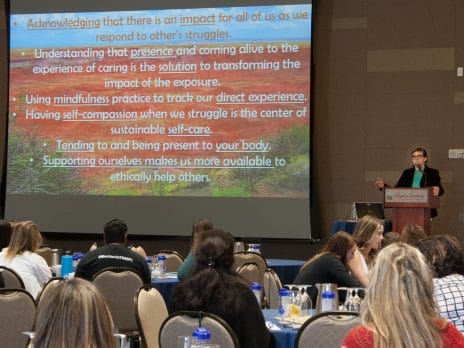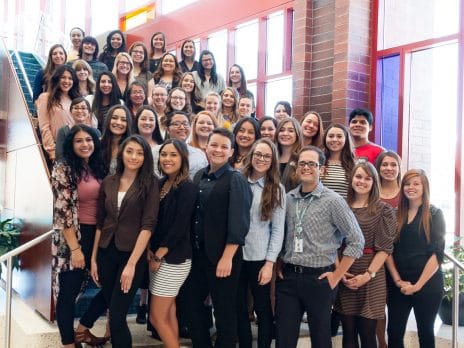
Let’s be honest – social work is hard. Helping professionals put their hearts and minds into supporting others every day, and must develop unique skills to remain healthy, happy, and resilient under pressure.
There are times when every social worker experiences distress as a result of their work, and research shows that this can increase rates of burnout, job turnover, and life stress. Self-compassion, healthy boundaries, and ongoing attention to personal needs allow people to manage professional challenges, and can improve wellbeing enormously.
The NAU Social Work program emphasizes the importance of self-care throughout the student’s coursework. When it comes to developing critical skillsets like these, however, firsthand experience is key. Senior Christi Fogtman writes, “As students, we learn about the importance of self-care. It is not until we enter into our internships, though, that we really begin to understand how necessary it is.”
NAU’s BSW seniors complete 480-hour field education placements (internships), working directly with vulnerable populations in schools, community mental health agencies, head start centers, child welfare agencies, crisis centers, and health care centers. They receive one-on-one mentoring and support from Social Work professionals, and from NAU’s SW Field Education Director, Julie Fritzler.
Social Work students have many challenging experiences in their internships, and some are harder to navigate than others. Our field education program prepares students to identify personal strengths and work through these challenges. They have the professional and emotional support of
their mentors, teachers, and cohort to help them transition from campus to career.” Julie Fritzler, Social Work Field Education Director
With this in mind, this year’s Social Work Field Education Symposium was designed to help reinforce good self-care practices. At the symposium, an annual training for NAU’s graduating BSW students and Agency Field Instructors, Andrea Meronuck, Clinical Director of Northland Family Help Center, presented on Personal Sustainability in the Helping Professions.
“When we stop caring for ourselves, we stop caring for others. Little things, like supportive touch and being present in the moment, are easily forgotten, but can go so far. Andrea encouraged us to always remember that self-compassion does not equal selfishness,” wrote student Christi Fogtman. Alongside faculty, field instructors, and the rest of their cohort, students learned new strategies for self-care. Throughout the presentation, they had opportunities to refine self-care plans, connect with and support peers, and discuss how they can structure their lives and careers for sustainability and happiness.

When asked about their practices, members of this year’s graduating class really drove home the value they place on personal time and community support:
McKayla Bradley wrote “I really love cycling and running when I have high levels of stress. Other times I enjoy practicing yoga or meditating. After the symposium, I think I need to start treating myself more like how I would treat a friend. Rely on your peers, colleagues, and professors for support! There is a good chance that they are going through something similar, or have already been through it before.”
Shannon Humphrey writes, “I have grown so much by giving myself self-compassion which associates to self-care. I go on plenty of trips around and outside of Flagstaff. I enjoy having me time.”
SELF-CARE RESOURCES
If you’re reading this and wishing you could have been there, don’t worry! There are plenty of resources available. Your self-care practice, of course, will reflect the things that make you happy. Most important, is that you decide to treat yourself well every day.